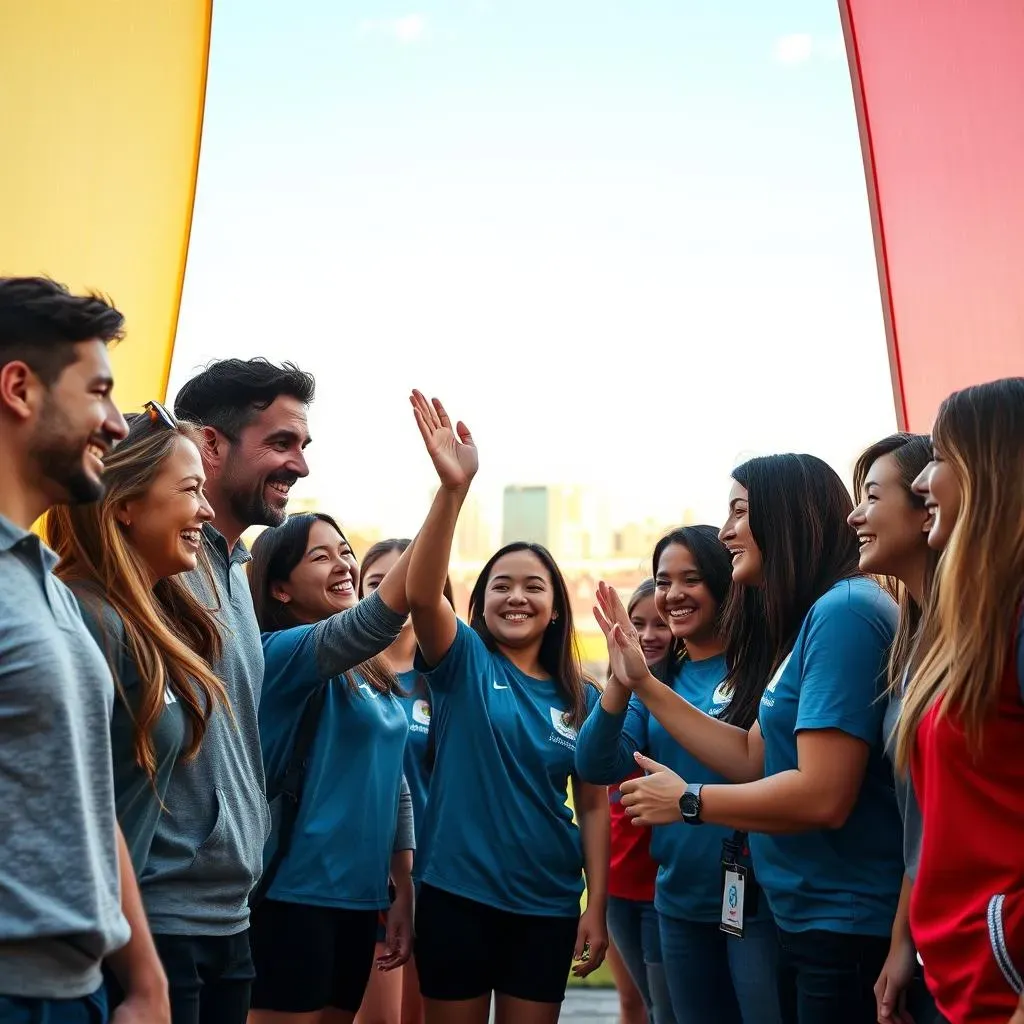Table of Contents
So, your sports team needs some extra cash? Fundraising can feel like a marathon, not a sprint, but don't worry! This article is your ultimate guide to navigating the world of "Tips for successful sports team fundraising campaigns." We'll cover everything from the crucial initial planning stages – setting realistic goals and choosing the right fundraising approach – to the exciting creative ideas that will get your team noticed and your donations rolling in. We'll explore innovative methods beyond the usual bake sales and car washes, helping you think outside the box and tap into untapped resources. But it's not just about the ideas; we'll also share practical tips to maximize your efforts, ensuring you get the most bang for your fundraising buck. Finally, we'll look at how to analyze your campaigns, learn from your successes (and even your minor setbacks!), and refine your strategies for future fundraising endeavors. Get ready to transform your fundraising game and secure the funds your team needs to succeed!
Setting the Stage for Successful Sports Team Fundraising Campaigns

Setting the Stage for Successful Sports Team Fundraising Campaigns
Hey, so you're diving into sports team fundraising? Awesome! Before you even think about bake sales or car washes (though those have their place!), let's talk strategy. The key to a killer campaign is solid planning. First, define exactly what you're raising money *for*. New equipment? Tournament fees? A snazzy new team bus? Be specific! Then, set a realistic fundraising goal. Don't aim for the moon if you're only shooting for the stars—it's demotivating. Once you have your "why" and your target amount, create a detailed timeline. This isn't just about the fundraising event itself; it includes pre-campaign promotion, the event itself, and post-event thank-yous. Think of it like training for a marathon: you need a plan to reach the finish line.
Step | Action | Timeline |
|---|---|---|
1 | Define Fundraising Needs | Week 1 |
2 | Set Realistic Goal | Week 1 |
3 | Develop a Detailed Timeline | Week 2 |
4 | Identify Potential Funding Sources | Week 3 |
5 | Create a Marketing Plan | Week 4 |
Next, explore different funding avenues. Don't limit yourself to one idea. A mix of strategies is often the most successful. Think about sponsorships from local businesses, online crowdfunding platforms, and traditional fundraising events. Consider your team's strengths and the interests of your community. Do you have amazing athletes who could offer coaching clinics? Could you host a fun tournament or competition? The possibilities are endless when you start thinking creatively. Remember, the more diverse your fundraising strategy, the more likely you are to reach your goal.
- Sponsorships: Approach local businesses for donations or in-kind contributions.
- Crowdfunding: Utilize online platforms to reach a wider audience.
- Events: Organize fun, engaging events tailored to your community.
- Grants: Research potential grants from sports organizations or foundations.
Creative Fundraising Ideas for Sports Teams: Think Outside the Box

Creative Fundraising Ideas for Sports Teams: Think Outside the Box
Team-Themed Merchandise Extravaganza
Forget the generic car wash! Let's get creative with merchandise. Design custom team apparel – think t-shirts, hoodies, hats – with unique designs reflecting your team's spirit or a memorable moment. Sell these online through platforms like Etsy or Shopify, or set up a pop-up shop at local events. You could even collaborate with a local artist to create one-of-a-kind designs that will really stand out. Don't underestimate the power of branded merchandise – it's a fun way to show team pride and generate income simultaneously. Think about offering different price points to cater to a variety of budgets, and consider offering pre-orders to gauge interest before committing to a large print run. Remember that a professional logo and clear branding will make your merchandise even more appealing.
Consider offering personalized items, like jerseys with individual names, adding a personal touch that increases the appeal for buyers. You can also create a range of merchandise, from keychains and stickers to mugs and phone cases, to appeal to a wider range of interests and budgets. This will not only generate revenue but also create a lasting legacy for your team. The key is to make it fun, memorable, and high-quality.
Merchandise Item | Cost | Selling Price | Profit Margin |
|---|---|---|---|
T-Shirt | $5 | $15 | $10 |
Hoodie | $10 | $30 | $20 |
Hat | $3 | $10 | $7 |
Skill-Based Fundraisers: Show Off Your Talents!
Your team's got talent – let's showcase it! Instead of just selling things, offer services. If your team excels at a particular sport, organize coaching clinics for younger kids or adults in your community. Are you all amazing bakers? Host a pie-making competition or a cupcake sale with a twist (like a team-themed decorating contest!). If you're musically inclined, put on a concert or talent show. The possibilities are as vast as your team's skills! Make sure to clearly communicate the skills you're offering and the value proposition for potential clients. This way, you can set competitive prices and attract more participants.
Remember to promote your services well in advance, highlighting the unique skills and expertise your team members bring to the table. You can use social media, local newspapers, and community bulletin boards to spread the word. Make sure to clearly state the pricing, schedule, and location of your services to avoid any confusion. Don't forget to collect payments securely and issue receipts to your customers. Consider offering discounts for group bookings or early bird registrations to attract more clients. This adds a unique element to your fundraising strategy.
- Coaching Clinics (Basketball, Soccer, etc.)
- Team-Themed Baking Competition
- Musical Performance/Talent Show
- Personalized Fitness Training Sessions
Tips for Maximizing Your Sports Team Fundraising Campaigns

Tips for Maximizing Your Sports Team Fundraising Campaigns
Harness the Power of Social Media
Let's be honest, social media is where it's at. Don't just post a fundraising link and hope for the best. Create engaging content! Show behind-the-scenes glimpses of your team, highlight individual player achievements, and use compelling visuals. Run contests and giveaways to increase engagement. Think short, snappy videos, eye-catching images, and stories that connect with your audience on an emotional level. Remember to use relevant hashtags to increase visibility and target your posts to the right audience. Don't forget to regularly update your followers on your progress. Transparency builds trust, and that leads to more donations.
Consider using Instagram Stories and Facebook Live to showcase your team's activities and personalities. These platforms allow for real-time interaction with your audience, creating a more personal connection. You can also use these platforms to run polls and quizzes, engaging your audience and gathering valuable data. A well-designed social media strategy can dramatically increase your reach and effectiveness. Don't just broadcast; interact! Respond to comments, answer questions, and make your followers feel valued.
Platform | Strategy | Example |
|---|---|---|
Behind-the-scenes videos | Short clips of practices, team bonding | |
Live Q&A with players/coaches | Answer questions about the team and the fundraiser | |
Regular updates on fundraising progress | Tweet milestones reached and thank donors |
The Art of the Ask: Making it Personal
It's not enough to just *have* a fundraiser; you need to *ask* for donations effectively. Don't be shy! Personalized emails or messages are far more effective than generic appeals. Connect with potential donors on a personal level. Share your team's story, highlight the impact their donation will have, and express genuine gratitude. Think about crafting different messages for different audiences – parents, local businesses, and community members may all respond to different appeals. Personalization is key to achieving higher donation rates.
Consider adding a personal touch to your donation requests. For example, you could include a short video message from a team member, a heartfelt letter from the coach, or a picture of the team in action. You can also segment your audience based on their past donation history or their level of engagement with your team's social media channels. This allows you to tailor your messages to the specific interests and needs of each group, increasing the likelihood of receiving a donation. Remember, a heartfelt "thank you" goes a long way.
- Personalize donation requests with individual stories.
- Highlight the impact of donations on the team.
- Express sincere gratitude for every contribution.
- Follow up with donors to maintain engagement.
Building a Strong Team: Collaboration is Key
"Alone we can do so little; together we can do so much." – Helen Keller. This quote perfectly encapsulates the importance of teamwork in fundraising. Don't shoulder the burden alone! Assign roles and responsibilities to team members, parents, or other volunteers. Delegate tasks like contacting sponsors, managing social media, and organizing events. A well-organized team is a highly effective team. Make sure everyone understands their role and feels valued for their contribution. Regular check-ins and open communication are essential to keep everyone motivated and on track.
Consider creating a fundraising committee with diverse skill sets. Assign roles such as marketing, finance, and logistics to ensure a smooth and efficient process. Regular meetings and clear communication will help keep everyone informed and aligned. Celebrate milestones and acknowledge contributions to boost team morale and maintain motivation. Remember, a successful fundraising campaign is a team effort, and acknowledging each member's contribution is vital for building a strong sense of community and shared purpose.
Analyzing and Improving Your Sports Team Fundraising Campaigns Tips for successful sports team fundraising campaigns Unlock your team's fundraising potential! Get expert tips & creative ideas to launch winning campaigns and achieve your goals. Read now! ```

Analyzing and Improving Your Sports Team Fundraising Campaigns Tips for successful sports team fundraising campaigns Unlock your team's fundraising potential! Get expert tips & creative ideas to launch winning campaigns and achieve your goals. Read now! ```
Okay, so your fundraising campaign is over. Now what? Don't just pack it all away! Analyzing your results is crucial for future success. First, gather all your data: how much did you raise, what were your expenses, and what were your biggest successes and failures? Compare your actual results to your initial goals. Did you meet your target? If not, why not? Were there any unexpected challenges or opportunities? This data-driven analysis will point you toward areas for improvement. Don't be afraid to be honest about what worked and what didn't—it's all part of the learning process.
Consider using a spreadsheet or a dedicated fundraising software to track your income and expenses. This will help you understand your profit margins and identify areas where you can cut costs or increase revenue. Analyzing your data will also help you identify trends and patterns in your donor behavior. This information can be used to tailor your future fundraising campaigns to better meet the needs and expectations of your donors. Remember, analyzing your fundraising data is not just about looking at numbers; it's about understanding the story behind those numbers.
Metric | Analysis | Actionable Insight |
|---|---|---|
Total Funds Raised | Exceeded/Met/Fell Short of Goal | Adjust fundraising goals for future campaigns |
Expenses | Identify cost-saving opportunities | Negotiate better deals with vendors, streamline processes |
Donor Demographics | Analyze donor age, location, etc. | Target future campaigns to key demographics |
Now, let's talk about improvements. What worked exceptionally well? What could you do differently next time? Did your social media strategy resonate with your audience? Did your chosen fundraising events attract the expected participation? Could you have better targeted your fundraising appeals? Were your thank-you messages effective? Addressing these questions honestly will help you refine your approach and improve your results in the future. Think about what you could do to make the process more efficient, more engaging, and more rewarding for both your team and your donors.
Consider sending out a post-campaign survey to your donors to gather feedback on their experience. This will help you understand what aspects of your campaign resonated with them and what areas you could improve. You can also analyze your marketing materials to see what messages or visuals were most effective in attracting donations. Gathering this information will help you create more successful fundraising campaigns in the future. Remember, continuous improvement is key to long-term success.
- Review social media engagement metrics.
- Analyze donor feedback (surveys, comments).
- Evaluate the effectiveness of different fundraising methods.
- Identify areas for cost reduction and efficiency improvements.
Finally, don't forget to celebrate your successes! Acknowledge the hard work of your team and thank your generous donors. This positive reinforcement will keep everyone motivated for your next fundraising endeavor. Remember, fundraising is an ongoing process—each campaign is a learning opportunity that contributes to your team's overall success. Keep learning, keep adapting, and keep raising those funds!
